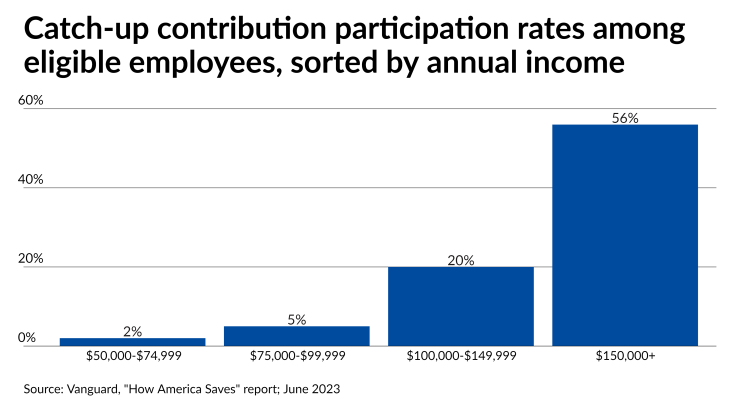A tweak to older, high-earning employees' retirement plans slated for next year could block a valuable tax break on "catch-up" contributions to 401(k)'s.
The fate of the
Stakeholders from the wealth management, retirement and insurance industries
Like the flexibility on required minimum distribution rules for recently inherited IRAs under the first Secure Act that
UPDATE
Read our in-depth coverage:
Pros and cons
On the minus side, those employees may not yet have access to a Roth option through their plans, and the tax break could vanish next year, according to financial planner Cristina Guglielmetti of Brooklyn, New York-based
On the positive side, the Roth contributions could help avoid a potential "
"A pro is tax diversification," she said. "I think having some Roth savings is good for everyone as a hedge against what might occur later. The typical assumption is that your tax rate will be lower in retirement, but if you've got sizable pretax savings already and have additional income from things like rent, pensions, continued consulting or part-time engagements, etc., you could be in a higher bracket than you think. This means the additional taxable income from bigger required distributions might impact things like the [Medicare income-related monthly adjustment amount]."
The adjustment takes away the deduction and the ability to "defer the tax liability later to a lower-income year resulting in a lower effective tax rate," advisor Greg Fortier of Needham Heights, Massachusetts-based
"It's not all bad though!" Fortier said. "Those earning more than $145,000 that are required to make Roth contributions will see their contributions grow tax-free compared to a traditional contribution which is taxed at ordinary income when withdrawn. For some folks a Roth contribution may make more sense. For example, if you are going to be in a higher tax bracket in retirement or planning for legacy purposes, a Roth may make more sense than a traditional contribution."
Regardless, he pointed out how the shift to Roth catch-ups provides greater tax revenue for the government upfront — which experts say helped pay for
Stakeholder concerns
The new catch-up rules have placed the companies and industry trade groups
In what the signers called "an urgent request," they warned Congress that the change to Roth contributions might "unintentionally result in the elimination of catch-up contributions" if it or the IRS or Treasury Department does not take action.
"These challenges exist in part because systems do not exist — and certainly cannot be built in 2023 — to instantly coordinate payroll systems (which determine who earned over $145,000 in the prior year) with plan recordkeeper systems that must ensure compliance with the new catchup rule," they wrote. "These circumstances pose a long list of other obstacles including, for many plans, the challenges of adding a Roth feature and communicating that feature to participants, as well as special challenges for state and local governments and collectively bargained plans. Obviously, any new rule requires new administrative work to implement. But we have been struck by the overwhelming input from the retirement community that this particular task simply cannot be done in time by a vast number of plans."
Representatives for the Treasury Department said the agency has heard the industry's concerns and plans to release guidance about the new Roth catch-ups soon.
The same members of Congress who received the letter from the wealth management, retirement and insurance firms and other signers had sent
"Congress did not intend to disallow catch-up contributions nor to modify how the catch-up contribution rules apply to employees who participate in plans of unrelated employers," the lawmakers wrote. "Rather, Congress's intent was to require catch-up contributions for participants whose wages from the employer sponsoring the plan exceeded $145,000 for the preceding year to be made on a Roth basis and to permit other participants to make catch-up contributions on either a pretax or a Roth basis."
Outlook for the future
Their letter signals that the technical revisions of the law are likely to happen by the end of the year, according to trade group lobbyists Jayne Fitzgerald, director of government relations for the
"It's clear that Congress intends to pass a law," Richman said. "They acknowledge making an error in the statutory language, and they've committed to fixing the bill to make sure it's implemented correctly."
While each of the three groups joined the letter requesting to suspend the tweak to catch-up rules for two years, none of them are seeking to eliminate the switch entirely. Many plan sponsors are hoping to receive some word from their payroll sponsors, who are in turn waiting for some indication from the federal government on how to move forward, Remo said.
"A lot of the payroll companies, they're awaiting guidance from the Treasury and IRS before they build their systems," he said. "The longer that process takes, it'll be harder and harder to implement Section 603. … We understand that this was one of the main revenue raisers within the legislation to get it done."
The IRS has pushed back implementation or enforcement of certain rules in the past, Fitzgerald noted, citing "a transition period" that the agency
"What I'm hearing is that there's a lag in knowing exactly what a person's made in the prior year," Fitgerald said. "That's just one example of some of the obstacles. It sounds small, but when you're doing it for a lot of employees, it's big. So you have to adjust your system."
UPDATE
Read our in-depth coverage:









